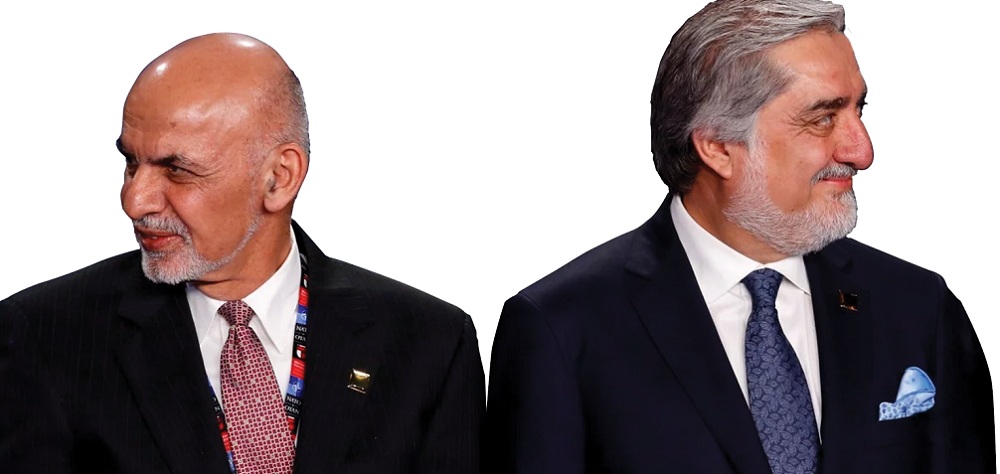Alwaght- Half a year after the presidential elections in Afghanistan, the government is yet to be formed in the country.
The two main rivals of the election, Ashraf Ghani and Abdullah Abdullah, still pose as challenges to each other. Abdullah’s election team, calling itself “Team Stability and Unity” has rejected the election results that were announced on February 18 which said Ghani is the winner of the race.
Despite that, informed resources recently said that the two sides have plans for a power-sharing government to get the country out of the current political impasse.
A participatory government in Afghanistan
The suggestion for a shared government was made by sources close to Abdullah and reports said that the leadership council of the TSU led by Abdullah has approved to form a government with Ghani.
Batur Dustam, the chief of the central council of National Islamic Movement, in comments on the initiative said that TSU’s initiative emphasizes on “realization of the rightful ideals and will of the people, cancelation of the fraudulent election results, election system alteration, municipality elections, and broader executive powers to the governors.”
It seems that what pushes Abdullah to such a suggestion is concerns about the future of the country and the indecision of the peace negotiations with the Taliban insurgent group.
The obstacles ahead of the power-sharing government
Growing distrust: There is no doubt that the growing mistrust of the two rivals in each other is the main hurdle ahead of a power-sharing government. This factor is, from another aspect, caused by the unsuccessful performance of the government of Ghani when he led the national unity government since 2014.
According to the 2014 deal, the Loya Jirga, a tribal assembly, was set to negotiate the creation of a prime minister post beside the presidency. But Ghani then declined to accept the idea. As a result, Abdullah who was supposed to serve as the cabinet CEO temporarily remained in the post until the election was held in September 2019. PM post was never created.
Although there have been suggestions by Ghani to Abdullah for taking part in the power, the latter proposed a separate initiative calling it “participatory government” and asking for guarantees for distribution of the power. Ghani has so far not released a positive stance to the initiative. He is unlikely to accept the idea as Abdullah’s team eyes 60 percent of the power in a participatory government in which it can appoint local and national officials.
Ghani may get the public to the side of his rejection by arguing that the initiative is in violation of the constitution of Afghanistan.
In fact, beside Abdullah’s distrust, Ghani is worried about losing his power and losing his upper hand in the political developments.
Ethno-sectarian diversity: Another challenge ahead of an agreement between the two sides is the existence of diverse ethno-sectarian groups and parties inside the two major camps.
Even when Abdullah unveiled the participatory government proposal, some groups and parties close to him clashed over accepting or rejecting his initiative.
In the Abdullah-led TSU, political and sectarian figures like former foreign minister Zalmai Rassoul, the brothers of the former president Hamed Karzai, former governor of Nangarhar Province Gul Agha Sherzai, Vice President Amrullah Saleh, General Abdulla Rashid Dostum, and former Vice President Ahmad Zia Massoud, and also some affiliates of Hizb-e-Islami led by Gulbuddin Hekmatyar are members. This shows the diverse ethnopolitical makeup of the alliance.
Some of these groups may choose, against Abdulah’s will, not to enter a deal with Ghani. This can present a big obstacle ahead of the agreement. Perhaps in case of an agreement, TSU will see defections.
On the opposite side, Ghani’s team is similar when it comes to the spectrum of politics and ethnicity, something making an accord between the two seriously difficult.
From another aspect, each of these ethical and political groups expects shares from power. If a possible power-sharing agreement does not meet their expectations, clearly it will find ahead of it the opposition of them. This is a major challenge to the participatory government.
Future of peace talks
Additionally, one of the important issues related to the future government is the negotiations with the Taliban. Some experts say that what has caused Abdullah to make a suggestion to participate in the government of Ghani is the peace talks with the insurgent group and its return to the country’s political scene.
Following the election results announcement, Abdullah appeared to be not satisfied with less than the cancellation of the “fraudulent votes.” But now with his proposal, he seems to have modified the ceiling of his earlier demands. Modification of his demands may stem from his bigger worry about quitting the negotiations with the Taliban by a considerable part of the Afghanistan society.
In other words, Abdullah who represents the Hazara ethnical group and the northern community in the politics, is worried that by seizing the power by Ghani and following the peace process with the Taliban, the power will be monopolized by the Pashtun community that includes Ghani camp and the Taliban. The seizure of power by the Pashtuns will cause a difficult situation for Abdullah and the Hazaras. So, by a participatory government proposal, Abdullah on the one hand seeks to prevent monopolization of the power by the Pashtuns and on the other hand save the share of the Hazaras and other ethnopolitical groups in the power structure. One of the main terms of Abdullah’s initiative is the formation of the “ministry of reconciliation” under his supervision to pursue the peace talks with the Taliban, though the negotiations are yet to be concluded and they cannot reach a comprehensive result until a government is formed in Kabul.



























